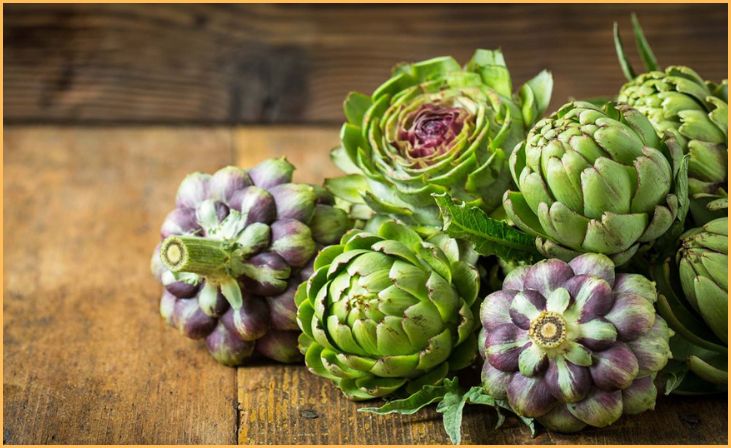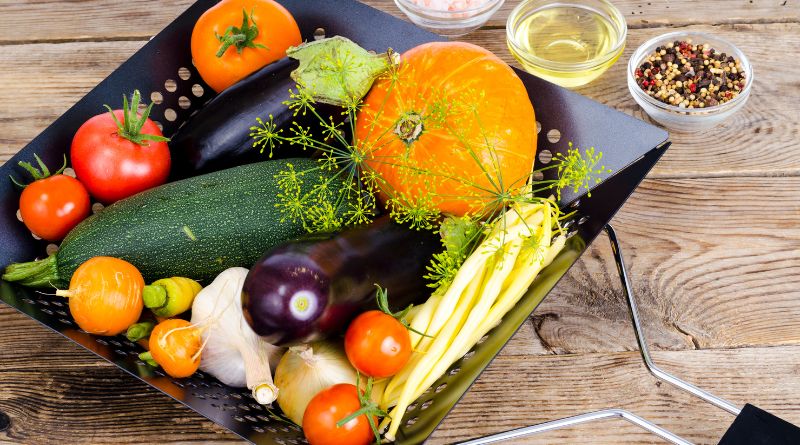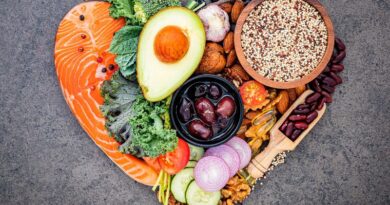When it comes to a healthy diet, fiber is your friend. It aids in digestion, supports gut health, and helps you feel full and satisfied. If you’re looking to increase your fiber intake, look no further than these nutrient-packed vegetables. From artichokes to cauliflower, we’ve ranked the 9 Best High-Fiber Vegetables that can easily find a place in your meals. Let’s dive into the world of fiber-rich goodness.
Fiber is an essential component of a balanced diet, and vegetables are an excellent source of this nutrient. Incorporating high-fiber vegetables into your meals can provide a range of health benefits, from improved digestion to better weight management.
Top High-Fiber Vegetables
These vegetables not only pack a flavorful punch but also offer a substantial dose of fiber, contributing to overall well-being. Join us as we explore the nutritional virtues of these high-fiber vegetables, providing you with insights to make informed choices for a fiber-rich and health-conscious diet.
Artichokes

Artichokes, beyond their delightful taste, emerge as nutritional powerhouses, boasting a wealth of dietary fiber and antioxidants. This unique vegetable, with its intricate structure and tender heart, adds a distinctive charm to culinary creations. The high fiber content in artichokes contributes to digestive health, promoting a feeling of fullness and aiding in weight management.
Additionally, the antioxidants present in these delectable globes play a role in combatting oxidative stress and supporting overall well-being. Whether featured prominently in salads, grilled to perfection, or incorporated into savory dishes, artichokes bring a flavorful and nutrient-rich dimension to the table. The versatility of artichokes allows them to shine as both a stand-alone star and a complementary addition, elevating the nutritional profile of meals while enhancing the dining experience.
Exploring the culinary possibilities of artichokes not only indulges the palate but also aligns with a health-conscious approach, making them a tasteful and wholesome addition to your dietary repertoire.
Quick Link: 10 Vegetables That Are Secretly Making You Gain Weight
Peas
Whether you choose the classic green peas or the delicate snow peas, a treat for your taste buds awaits. Despite their small size, these legumes pack a powerful nutritional punch, providing a substantial amount of dietary fiber along with a rich array of vitamins and minerals. Green peas, with their sweet and vibrant flavor, bring a delightful burst to various dishes, while snow peas, with their crisp texture, add a refreshing crunch to stir-fries and salads. The fiber content in both varieties supports digestive health and aids in maintaining a sense of fullness.
Additionally, the vitamins and minerals present contribute to overall well-being. The versatility of peas allows for creative culinary exploration, making them a versatile and nutrient-dense addition to your meals. So, whether you’re enjoying them as a side, a snack, or an integral part of a main course, green peas and snow peas bring not only flavor but also a host of nutritional benefits to the table.
Broccoli
Broccoli stands as a bona fide nutritional powerhouse, offering a remarkable combination of health benefits. This versatile vegetable boasts a high fiber content, contributing to digestive health and supporting weight management. Beyond fiber, broccoli is a rich source of essential vitamins, including vitamin C, vitamin K, and folate, providing a robust nutritional profile. Its impressive array of health-supporting compounds, such as sulforaphane, adds an extra layer of benefits, potentially promoting overall well-being.
Whether steamed to preserve its crispness, roasted for a delightful caramelized flavor, or added to vibrant stir-fries, broccoli effortlessly lends itself to various culinary creations. The adaptability of broccoli not only enhances its appeal but also ensures that its nutritional value is easily incorporated into diverse dishes.
Incorporating broccoli into your meals not only indulges your taste buds but also aligns with a health-conscious approach, making it a delicious and nutrient-dense addition to your dietary repertoire.
Brussels Sprouts
Brussels sprouts, despite their diminutive size and charming appearance, emerge as nutritional powerhouses with a substantial dose of fiber. These mini cabbages not only add a touch of cuteness to your plate but also contribute to digestive health and a sense of fullness. Roasting Brussels sprouts is a culinary magic trick, transforming them into a delectable treat by bringing out their natural sweetness and imparting a delightful crispy exterior. Alternatively, a quick sauté can turn them into a nutritious and flavorful side dish, perfect for adding a burst of green goodness to your meals.
The versatility of Brussels sprouts allows them to shine in various cooking methods, making them a welcome addition to salads, stir-fries, or as a standalone side. By embracing the charm and nutritional benefits of Brussels sprouts, you not only elevate your culinary experience but also ensure a health-conscious choice that adds both flavor and fiber to your diet.
Carrots

Carrots, with their crunchy texture and vibrant orange hue, go beyond being a beloved snack; they are a nutritional powerhouse. Packed with dietary fiber, carrots offer more than just a satisfying crunch—they contribute to digestive health and a sense of fullness. This versatile vegetable can be enjoyed in various forms, from raw sticks dipped in hummus to being a star ingredient in soups, stews, and salads. The dietary fiber in carrots aids in maintaining a healthy digestive system, promoting regular bowel movements, and supporting overall well-being.
Rich in vitamins and antioxidants, carrots also contribute to maintaining healthy skin and supporting immune function. By incorporating carrots into your diet, you not only enhance the visual appeal of your meals but also make a smart choice for your overall health, combining flavor, crunch, and nutritional benefits in a single, vibrant package.
Also Read: 10 Vegetables That Could Be Sneaking Extra Pounds onto Your Plate
Spinach
Spinach, celebrated for its nutrient density, emerges as a noteworthy source of dietary fiber, adding to its reputation as a nutritional powerhouse. Whether incorporated into refreshing salads, blended into nutrient-packed smoothies, or used in various cooked dishes, spinach stands as a versatile and valuable contributor to your daily fiber intake. The fiber content in spinach plays a crucial role in supporting digestive health, promoting regular bowel movements, and contributing to a sense of fullness.
Beyond fiber, spinach is rich in essential vitamins and minerals, including iron and vitamin K, offering a holistic approach to well-being. Its adaptability in culinary applications makes it an easy and delicious addition to a wide range of dishes, ensuring that you can enjoy the benefits of increased fiber intake without compromising on flavor or variety. By making spinach a staple in your diet, you not only enhance the nutritional profile of your meals but also make a conscious choice for overall health and wellness.
Sweet Potatoes
Sweet potatoes, with their eye-catching and vibrant color, extend beyond mere visual appeal to become a fantastic source of dietary fiber and an array of essential nutrients. Their versatility knows no bounds, seamlessly transitioning between sweet and savory dishes easily. The fiber content in sweet potatoes not only supports digestive health but also aids in maintaining a sense of fullness, making them a valuable addition to a well-balanced diet. Rich in vitamins such as vitamin A and vitamin C, as well as minerals like potassium, sweet potatoes offer a nutritional bounty that goes beyond their delectable taste.
From classic mashed sweet potatoes to innovative sweet potato desserts, their adaptability in the culinary realm allows for creative exploration, ensuring that they remain a staple in diverse cuisines. By incorporating sweet potatoes into your meals, you not only enjoy their delightful flavor and texture but also make a nutritious choice that enhances the overall profile of your diet, combining visual appeal, versatility, and health benefits in every bite.
Acorn Squash
Acorn squash, a comforting gem in the winter vegetable lineup, brings not only warmth but also a substantial dose of dietary fiber to the table. The innate sweetness of acorn squash can be heightened by roasting, transforming it into a delightful treat that complements both sweet and savory dishes. Roasting accentuates its natural sugars, creating a caramelized exterior that enhances its flavor profile. Whether enjoyed as a comforting side dish or seamlessly incorporated into various recipes, acorn squash lends a rich, nutty taste to winter meals.
Beyond its fiber content, acorn squash is a nutritional powerhouse, offering essential vitamins and minerals. By savoring the roasted goodness of acorn squash, you not only indulge in a seasonal delight but also make a nutritious choice that contributes to your overall well-being, making winter meals both comforting and health-conscious.
Also Check: Best Vegetable Beef Soup Pioneer Woman: Tastiest Soup Ever!
Cauliflower

Cauliflower, a true culinary chameleon, stands out not just for its low-calorie nature but also for its impressive fiber content. With a neutral flavor profile and an adaptable texture, cauliflower has become a favorite for crafting healthy substitutes in various dishes. Cauliflower rice, a popular alternative to traditional rice, and cauliflower pizza crust, a creative twist on the classic, showcase its versatility in the kitchen.
Beyond being a fiber-rich addition to meals, cauliflower is also rich in vitamins and minerals, making it a nutritional powerhouse. Its ability to absorb flavors makes it a suitable canvas for a variety of seasonings and sauces.
By incorporating cauliflower into your meals, you not only enjoy its light and satisfying texture but also make a smart choice for those seeking low-calorie, fiber-packed alternatives, elevating your culinary experience while maintaining a health-conscious approach.
Incorporating high-fiber vegetables into your diet is a delicious and health-conscious choice. From artichokes to cauliflower, these nutrient-packed veggies offer a diverse range of flavors, textures, and culinary possibilities.
Bottom Line
As we conclude our exploration of the best high-fiber vegetables, it’s evident that nature’s bounty provides a diverse array of options for those seeking to boost their fiber intake. From crunchy broccoli to versatile legumes, these vegetables not only contribute to digestive health but also bring a spectrum of nutrients to the table. Incorporating a variety of high-fiber vegetables into your diet offers a flavorful and nutritious way to support overall wellness.
Remember, balance is key, and the beauty of these vegetables lies not only in their fiber content but also in their ability to enhance the taste and texture of your meals. Cheers to a fiber-filled and wholesome culinary journey!
FAQs
Fiber plays a crucial role in maintaining digestive health, regulating blood sugar levels, and supporting weight management. Additionally, it contributes to a feeling of fullness, aiding in appetite control.
Add a variety of high-fiber vegetables to salads, soups, and stir-fries. Snack on raw veggies with hummus or incorporate them into smoothies for an extra fiber boost.
While fiber supplements can be convenient, it’s preferable to obtain fiber from whole foods like vegetables, fruits, and grains, as they offer a broader range of nutrients.
Excessive fiber intake can lead to bloating and digestive discomfort. It’s important to gradually increase fiber intake and stay well-hydrated to help manage these potential side effects.







